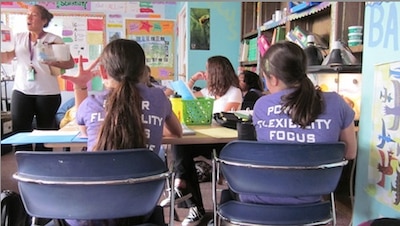Donnell-Kay Foundation fellow Yilan Shen says that arguments about whether charter schools are simply good or bad are outdated.

I was recently asked if the Donnell-Kay Foundation was pro-charter schools. I am surprised at how often this question is still asked of me, the foundation, and other organizations in the 20th year that charter schools have been educating Colorado students. As the Future School Finance Act moves through the legislature containing the highly contentious amendment to increase funding for charter schools and other components that affect charters, it is clear that the charter school issue is still a dividing line in the political sand around public education. To raise the level of student achievement in Colorado, it is time to elevate the level of dialogue about schools and to move beyond the outdated politicized categorizations of pro- or anti-charter schools.
Equity and adequacy are two of the main goals in reforming the state’s school funding system. As SB 213 and the pending ballot initiative are debated in the state, it is important to keep these goals in mind. The amount of public money that is spent on a student should not be dependent on the school he or she attends. There is a stark funding disparity between charter schools and traditional district schools, with the average charter school in Denver receiving $2,700 or one third less in per-pupil funding than the average district school.
Skepticism and dogmatism about a particular school governance structure are no longer productive in the discussion of how to fund student achievement. There are about 89,000 students in 187 charter school campuses around the state, a number that is expected to grow in the coming years and decades. There are schools that are carrying out the promise of educating our future workforce adequately in both charter and more traditional public schools. This diversity of solutions will help to drive an increase in quality outcomes, but those solutions are not currently funded equitably.
As SB 213 jumps the last hurdles in the legislature, education stakeholders and the voting public will have to start thinking about the ballot initiative in the November election. Debates about funding equity, educational equity, and quality school options in Colorado must move beyond the obsolete face-off between charter supporters or charter opponents. The last time I was asked about Donnell-Kay Foundation’s stance on charter schools, my answer was merely an echo of the belief held by those of us who believe there are other more constructive battles to be fought, “It is not about charter schools or traditional schools, it is about excellent schools or failing schools.” As you consider your position for this fall’s ballot initiative, I hope you will support equitably giving all of our students the opportunities to succeed.
This piece was cross-posted from the Donnell-Kay Foundation’s blog.
About our First Person series:
First Person is where Chalkbeat features personal essays by educators, students, parents, and others trying to improve public education. Read our submission guidelines here.
